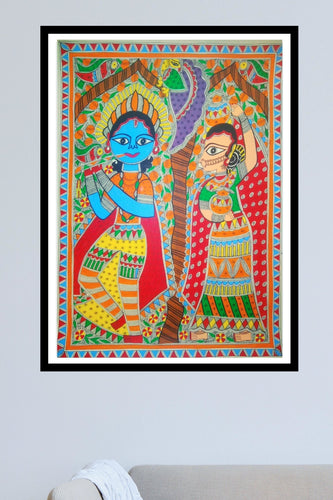Madhubani art/ Mithila art (the term ‘Madhubani’ translates to ‘forest of honey’) originating from the Mithila region of Bihar, India is a traditional art form celebrated for its beautiful patterns, vibrant colors, and rich cultural significance. Traditionally, these paintings were executed by women on the walls and floors of homes during festivals, weddings, and religious ceremonies. The paintings depict subjects based on Hindu mythology, nature, folklore, and everyday life. Overall,
Madhubani art is the creative representation of all the motifs, colors, and forms found in the vicinity and incorporates a blend of history, tradition, and mythology.
The common subjects in Madhubani art include Hindu deities such as Lord Krishna, Lord Rama, Goddess Durga, and Shiva-Parvati. Many works capture scenes from epics like the Ramayana and Mahabharata. Nature is frequently represented through motifs of flowers, birds, animals, and celestial bodies like the sun and moon, symbolizing growth, harmony, and continuity. Social issues like women’s empowerment, ecological concerns, and anti-war themes have also become more prominent in contemporary Madhubani art.
Legend
There are various legends associated with
Madhubani art. However, one of the popular beliefs states that King Janak (Father of Sita mentioned in Ramayana) commissioned craftsmen to decorate the state to celebrate her daughter’s wedding with lord Rama. Hence, establishing the tradition of Madhubani art in the region.
Materials and Method
Traditionally, Madhubani artists use natural pigments derived from plants, minerals, and other natural sources. Colors like black are created from soot, yellow from turmeric, blue from indigo, and red from kusum flowers. Brushes are often homemade, using bamboo sticks and cotton to create the delicate strokes. With fine detail as the foundation of the art, the entire surface is filled with patterns, ensuring there is no empty space. Today, while traditional natural colors are sometimes replaced with synthetic paints for durability, many artists still adhere to the original methods, maintaining the authenticity of the art form.
In the 1960s, a severe drought prompted the Indian government to support local artisans which gained international recognition for Madhubani art. Since then, Madhubani art has evolved from wall and floor paintings to various mediums, including canvases, textiles, pottery, and even contemporary art installations. Manju Devi, Ganga Devi, Jagdamba Devi, and Bharti Dayal are some of the notable Madhubani artists.
Madhubani painting encompasses several distinct styles, including:
- Kachni (Line Art): This style emphasizes intricate linework, using fine, elaborate patterns to fill the entire surface. Generally, black ink is used for outlining.
- Bharni (Filling Art): Known for its vibrant colors, Bharni style fills the outlined shapes with solid colors, often depicting deities and mythological figures.
- Godna (Tattoo Art): Inspired by traditional tattoo patterns, Godna style uses simple, linear motifs, often showcasing daily life, flora, fauna, and geometric shapes.
- Tantrik: This style is more spiritual and abstract, often depicting deities like Kali, Durga, and the yantras associated with Tantric worship.
- Kohbar: Focused on marriage rituals, Kohbar paintings symbolize fertility and prosperity, featuring motifs like lotus, fish, bamboo, and snakes.
Significance of Madhubani
Madhubani art holds immense cultural, social, and religious significance. It serves as a powerful expression of the Mithila community’s traditions, beliefs, and connection to their environment. Besides its aesthetic appeal, Madhubani art plays an important role in preserving stories from Hindu mythology and local folklore. The art form also provides a livelihood to many women artists in Bihar, contributing to the economic and social empowerment of rural communities. Internationally, Madhubani has earned acclaim for its unique style and vibrant cultural narrative, and it stands as a testament to India’s rich heritage and its evolving expressions of traditional art.
FAQs
Are there different styles of Madhubani painting?
Yes, Madhubani painting has several styles, including Bharni, Katchni, Tantrik, Godna, and Kohbar, each with its unique patterns and techniques.
How can I display Madhubani paintings in my home?
Madhubani paintings can be framed and hung on walls, used as decorative panels, or even incorporated into furniture designs. Their vibrant colors and intricate designs make them a focal point in any room.
How do I care for a Madhubani painting?
To preserve your painting, keep it away from direct sunlight and moisture. Regularly dust the surface with a soft cloth to maintain its vibrant appearance.
Why is Madhubani art significant?
Madhubani art is not only a form of artistic expression but also a cultural heritage that has been passed down through generations, reflecting the history, beliefs, and social values of the Mithila region.

